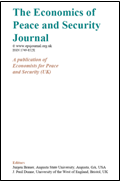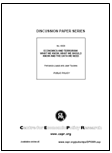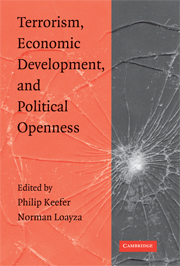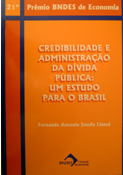Sunday, 6 July 2025, 6:40 AM
Site: Moodle @ FCTUNL
Course: Fernanda Llussá (fajl)
Glossary: Main publications
1
1994“Brazilian Trade Policies and Economic Effects of the North American Free Trade Agreement (NAFTA)”.National Association of Research in Economics (ANPEC), Brazil. Paper Proceedings, 1994. F. Llussá The paper crosses information on the composition of Brazilian exports in 1993 and on Mexican exports that benefit most from the North American Free Trade Organization (NAFTA) to compute the likely trade diversion affecting Brazilian exports to the United States. |
1998“Credibility and Public Debt Management: A Case Study of Brazil”. Edited by Banco Nacional de Desenvolvimento Económico e Social (BNDES), Brazil, 1998.
by F. Llussá The volume has received the 21st “Prêmio BNDES de Economia”.This book discusses the management of Brazilian public debt, especially as it refers to the profile of disbursements. We first discuss three very recent models in economics that deal with the issue and survey how the federal debt in Brazil has evolved in its characteristics of size, composition, maturity and cost. We analyze the supply of public debt as well as the demand side, arguing that extending the average maturity, in a context of low credibility, would imply the payment of a premium that would compensate the long-run risk associated with investing in public debt. We suggest that cost would be too high and the supply of long-run debt, when the stabilization of the Plano Real had not yet been achieved, would just transfer to the future the low credibility levels existing today. We provide a critical analysis of the existing theoretical models, emphasizing that a pre-condition to extending the maturity of public debt issues in Brazil is a gain in credibility that depends, necessarily, on a fiscal adjustment that is sustainable in the long-run. Link for BNDES prizes: http://www.bndes.gov.br/conhecimento/publicacoes/catalogo/premio.asp Link for text: http://www.bndes.gov.br/conhecimento/premio/pr212.pdf |
2
2007“The economics of terrorism: a synopsis”, Economics of Peace and Security Journal, Vol. 2, Nº 1, 2007. F. Llussá and J. Tavares An overview of the economics literature on terrorism is presented. Papers are classified as to their macro versus micro and empirical versus theoretical emphasis. Although subjective, this classification makes clear where additional contributions can be made: most of the existing studies are of an empirical nature and examine the consequences of terrorist attacks at the aggregate level and in specific sectors of economic activity. In the case of the micro-based studies, the mix of papers is more balanced. The article concludes with a list of twelve papers that summarize what is now known about economics and terrorism. These twelve papers are suggestive of the broad range of questions addressed and the progress made, constituting a very useful introduction to the literature. |
2007“Economics and Terrorism: What we know, what we should know and the data we need”. Centre for Economic Policy Research (CEPR) Discussion Paper No. 6509, October 2007 F. Llussá and J. Tavares. In this paper we organize the literature on the economics of terrorism around seven different topics, offering a comprehensive view of the literature with a view to identifying questions that remain unanswered. The chosen topic areas are: The Measurement of Terrorist Activity, The Nature of Terrorists, The Utility Cost of Terrorism, The Impact of Terrorism on Aggregate Output, Terrorism and Specific Sectors of Activity, Terrorism and Economic Policy, and Counter-Terrorism. In a sense, we proceed from measurement issues to studies of the characteristics of terrorists and terrorist organizations, the consequences of terrorism on individual utility and, aggregate output and on specific sectors of activity, as well as the impact of terrorism on fiscal and monetary policies. We conclude with an examination of the economics literature on counter-terrorism measures. For each of the topics above, we present what the literature has achieved, the important questions that remain open and the type of data that would help researchers make progress. In our discussion, we identify the main papers in the literature and the issue(s) where each made a contribution, presenting a brief individual summary for these papers, organized along the topic areas. JEL Classification: A12, D10, E20, H00, K00 and O11 Keywords: counter-terrorism, economics of terrorism, nature of terrorists, output costs and utility costs. |
2007“Geography Matters More: Geographical and Institutional Determinants of Brazilian States´ Income”. Working Paper 517, Universidade Nova de Lisboa, 2007. F. Llussá Brazil displays a geographic and institutional diversity unique in the world. It extends in a north-south direction rather than the east-west of other countries of similar size. Given the current debate on the relative role of geography and institutions in determining income levels, Brazil provides a single testing ground for the direct and indirect effects of geography. This paper evaluates how much of the income differences across Brazilian regions and states stem from geographic characteristics and institutional characteristics, the latter in turn partly determined by geography. Our results show, first, that the rate of convergence of state income per capita increases substantially once regional effects are taken into account. Second, institutions, when instrumented with regional dummies, are a significant determinant of state income levels. However, when we add additional geographic characteristics, some institutions cease to significantly affect income. The message from Brazilian data seems to be that, tough geography and institutions matter for income, geography matters more. Keywords: Economic Growth; Geography; Institutions. JEL Codes: O11; O18; O43 |
2007“An Econometric Survey of Cross Country Analyses of Economic Growth”. Working Paper 518, Universidade Nova de Lisboa, 2007. F. Llussá This paper reviews the econometric methodology on panel data estimation and testing as applied to the study of convergence in growth empirics. The concept of absolute convergence states that the poorer economies should be growing at a faster rate, catching up the richer ones. The empirical failure of absolute convergence resulted in the development of alternative theories to explain long-term growth: the endogenous growth theories and the conditional convergence, the idea that countries may have different steady-states and it is the distance from their own steady-state that determines the rate of economic growth. This paper focuses on conditional convergence and its empirical testing. It discusses and compares the different econometric methodologies used in cross-section and panel data studies of conditional convergence. Also presented are the empirical results obtained by the various authors. Keywords: General Method of Moments, Conditional Convergence, Panel Data. JEL Classification: C3, C31, C33. |
2008“Economics and Terrorism: What We Know, What We Should Know and the Data We Need”. Llussá, F. and J. Tavares, 2008. in Keefer, P., and N. Loayza (eds.) “Terrorism and Development”, edited by the World Bank for the Cambridge University Press. |
